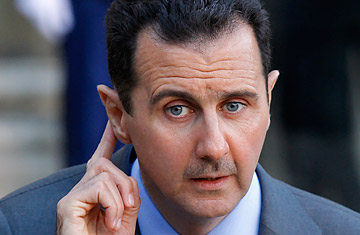
Syria's President Bashar al-Assad
(2 of 2)
"This bickering comes from the lack of leadership," says a political analyst in Damascus. "The regime does not have a long term vision, which explains the stupidity of its reaction in Daraa," where protests started on March 15 after kids were arrested and tortured for painting anti-government graffiti.
The way the family works is still unclear. Only Hafez al-Assad's iron-fisted rule was able to quell his own brothers' personal ambitions. One of them, Rifaat became a dissident in 1983. The fighting that ensued nearly shattered the unity of the dominating Alawi minority, whose cohesion and support are the backbone of the regime.
From Spain, where he now lives in exile, Rifaat and his sons Sumar and Ribal constantly challenge Bashar through their TV station ANN TV. Though their influence in Syria is questionable, other members of the clan who have stayed in the country could potentially turn against the president.
Like Mundher and Zawwaz, the president's cousins live like militia leaders in the Alawi mountains, the family's birthplace in Western Syria. "The family gives them some leeway and the current crisis is a perfect opportunity," says an expert on Syrian affairs.
Residents of Latakia and Banias accuse them of having stirred up religious tensions between Sunnis and Alawis at the beginning of the uprising by sending text message warnings: "Alawis are descending from their mountains to attack Sunnis" and "Sunnis are out on the streets to massacre Alawis." Residents also accused their militia known as the Shabiha of attacking their town.
There is another powerful family besides the Assads: the Makhlouf family. The ties between the two Alawi families date back to Hafez's wedding to Anisa Makhlouf. During the bitter battle between Rifaat and Hafez, the Makhloufs took Hafez's side and obtained wealth and influential positions in return. Rami Makhlouf, a rich businessman, is seen as the symbol of the regime's corruption. He is nicknamed "the king of Syria" while Bashar is only the president. His brother Hafez Makhlouf is the head of the Damascus security forces.
"The president wasn't made for the position he is in today," says a Syrian political analyst. "You can't improvise being a dictator. His father had to work, scheme, eliminate to gain power and consolidate it, while Bashar belongs to a generation of young heirs like Mohammed VI in Morocco or Abdullah II in Jordan who received power without really understanding how it works."
Brought to power by a system created by his father, but one that he doesn't control, Bashar al-Assad seems weakened. This could coalesce the family around new members who have become more powerful recently, and who would do anything to protect their interests.
Also from Worldcrunch:
Italian Mob Threatens Soccer Team Over Easter Procession
— La Stampa
Welcome To Yopougon, Where Ivory Coast's Civil War Rages On
— Le Monde
